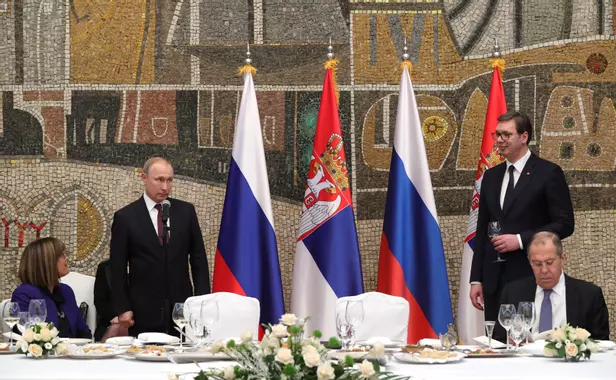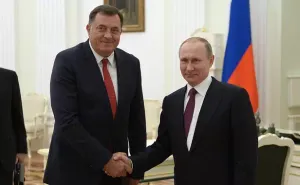EUROACTIV informs us that Serbia, through its President Aleksandar Vučić, and following a telephone call on Sunday 29 May 2022 with the President of the Russian Federation, Vladimir Putin, has reached an agreement announced as favourable regarding the purchase of Russian natural gas. However, the details of the agreement will be revealed in the near future.
However, President Vučić told the press that after the call to Moscow, Serbia will continue to receive Russian gas according to the current favourable formula, calculated on the basis of oil prices on the world market.
This means that Russia is waging its geoeconomic (and propaganda) war using hydrocarbons, as this makes Serbia the country with the best gas prices in Europe, adding that there was a "very good conversation between the two leaders on several issues, the most important of which was our bilateral relations and the gas agreement (...) We will be signing a three-year contract, and tomorrow or the day after tomorrow, we will discuss the amount of gas. Serbia needs large quantities of gas, but, if I may say so, we will have a safe winter, while the cost of gas depends on future talks".
The price Serbia would pay Russia's Gazprom for natural gas is now a third of the price paid by other European countries, Serbia's president said. The price could fall to a tenth or a twelfth during the winter period, with prices expected to range between $340 and $350 per 1,000 cubic metres, he added.
Vučić also said that the agreed price applies to 2.2 billion cubic metres of natural gas per year and that Serbia needs another 800 million cubic metres. Serbia is negotiating a new natural gas deal with Gazprom because the six-month agreement signed in November 2021 expires today, 31 May 2022. Russian natural gas currently costs Serbia $270 per 1,000 cubic metres.
Gazprom is the majority shareholder of the former local oil giant Naftna Industrija Srbije (NIS), either directly or through subsidiary companies. It is also the sole supplier of natural gas in Serbia and the majority owner of both pipelines delivering Russian gas to Serbia.
The Kremlin confirmed that Putin and Vučić had agreed that Russia would continue to supply natural gas to Serbia. Putin and Vučić exchanged views on a range of issues, including the situation in Ukraine and developments related to Kosovo. The two also "reaffirmed the mutual readiness" to constantly strengthen their countries' strategic partnership on the basis of the traditionally close ties between the two nations, the Kremlin said in a press release.
Additionally, at the end of March, Janaf, the Croatian state operator of the Adriatic pipelines, announced that it would suspend crude oil deliveries to NIS, which came under the control of Russia's Gazprom Neft in 2008, if the war did not end by 15 May, or if the Serbian state purchased a majority stake from Gazprom Neft. The contract between Janaf and NIS provides for the delivery of some 3.2 million tonnes of fuel, as part of the fourth package of sanctions imposed on Russia and approved by the Council of the European Union. These sanctions prohibit transactions with certain Russian-controlled companies, including NIS gasoline.
The Pančevo refinery, which covers approximately 70 per cent of Serbia's petroleum product needs, could not operate without Janaf's input, which supplies 3.2 million tonnes per year. Serbia's annual production of 800,000 tonnes, plus the 56,000 tonnes supplied by Romania, will not be enough to cover the country's needs. Other companies could be affected by these sanctions, such as Petrohemija, which specialises in petrochemicals.
Serbia imports 81 per cent of its gas and 18 per cent of its oil and oil products from Russia.
According to experts, Serbia's annual consumption of natural gas is around three billion cubic metres, of which 49 per cent goes to heating plants and heating and power plants, while 26 per cent is consumed by industry.
Meanwhile, households in Serbia consume about 13% of the total amount of gas, while commercial centres and other businesses consume about 10%. In contrast, the agricultural and transport sectors consume only 2%.
For Russia, the challenge is to "clean up" one of the last countries in Europe that does not disavow its friendship with Vladimir Putin's regime.
The use of Russian soft power through Gazprom in Serbia is also very interesting. Through its network of subsidiaries, for example through Gazprom Neft, the Russian gas giant, which has also been present in Europe's top club football competition for example, has for years been sponsoring sports clubs, such as the Red Star Belgrade football club (since 2010) and the Partizan basketball club, and funds festivals and other cultural events and institutions. In other words, they connect with the Serbian public through sport and cultural elements.
Four days after the start of the Russian invasion of Ukraine, the European Football Association (UEFA) decided to end its partnership (dating back to 2012) with Gazprom for all competitions. On the same day, German club Schalke 04, which will play again next season in the German top flight, also ended its cooperation with the Russian gas giant, removing its logo from players' shirts and from all Gazprom billboards in the club's stadium.
We can draw a line, which is what I intend for you to see, between Soft Power, energy and sports sponsorship, as Gazprom Neft remains the main sponsor of Red Star Belgrade, whose sponsorship deal runs until mid-2022.
Naftna Industrija Srbije (NIS), in which, as I explained above, Gazprom Neft has held a majority stake since 2013, is the main sponsor of Belgrade basketball club Partizan. In the case of both Red Star and Partizan both Serbian flagship clubs would have escaped bankruptcy precisely thanks to a financial injection from Gazprom Neft, directly or indirectly. The last renewal of NIS, as a subsidiary controlled by Gazprom Neft, dates back to November 2021.
In addition to sponsorship, sports clubs in Serbia also receive state funding, and despite years of talk of privatisation, privatisation has not yet taken place.
According to NIS Gazprom Neft itself, in addition to sports clubs, the company has financially supported the Science Festival, the Science Centre in Petnica, the Belgrade theatre Atelje 212, as well as other cultural institutions. Thus, for example, during 2020, NIS Gazprom Neft became the main sponsor of the Belgrade Dance Festival... and, of course, also helped to finance Russian language laboratories in two schools in Serbia. In June 2021, the one at St Sava Primary-University School in Belgrade was renovated, and in November 2019, a new laboratory was opened at the 4th of July Vocational School in Vrbas (Vojvodina). Both projects were carried out in cooperation with the Russian Embassy in Belgrade.
NIS Gazprom Neft has also been a long-time supporter of the EXIT Festival, which is the music and film festival in Kustendorf, the Belgrade FEST Film Festival and the Guča brass band festival. NIS Gazprom Neft is also present on the website of "Novi Sad - European Capital of Culture".
The Kustendorf Festival, which began in 2007 with the Serbian director Emir Kusturica, of which he is still the director, is worth mentioning in this regard. Kusturica, throughout these years and if we look at his public speeches, has been an open supporter of Vladimir Putin and his Russia, supporting, for example, the annexation of the Ukrainian peninsula of Crimea by Russia in 2014. For two years, 2017 and 2018, Kusturica was and performed live with his band in Yalta. For years, the Kustendorf festival has also been supported by the Serbian state.
Gazprom Neft has also financed the decoration of the interior of St. Sava Cathedral in Belgrade to a total value of around ten million euros. For this purpose, Russian painters were hired to paint the frescoes. The first donation contract (four million euros) was signed in 2017 by the management of Gazprom Neft, the then Serbian president Tomislav Nikolić and the former head of the Serbian Orthodox Church, Patriarch Irenaeus. The second contract (six million euros) was signed in 2019.
Around €35 million has been invested in total since 2009 by NIS Gazprom Neft directed towards various "socially responsible projects and support for professional sport" in Serbia.
As a result, for years now, Serbian public opinion has perceived Russia as a "friend", while the majority of the population is now against European integration, particularly as a result of the change in the media landscape since 2017, a phenomenon in which Serbian leaders have played a role. It is from 2017 onwards that the uncritical relationship towards Russia is established, in the form of a celebration of Russian-Serbian relations, centred on the cultural offensive on Serbian socio-cultural pillars. Despite the fact that real economic indicators show that Serbia's main trade partners are EU countries, not Russia... Does this Margaret Thatcher retort ring a bell? Can't fall in love with a market? Well, indeed, you can't, for that you need much more aggressive common policies, with a stronger definition of Soft Power (when you have it, and to spare... the idea of a new European Bauhaus of Ursula von der Leyen's Commission may be a good idea, but you need more... and you need to do it better... and for that we come back to the idea of federalism and a monetary, fiscal and banking union). And here, too, as always, paradoxically, the UK is not without reason. The current prime minister broadcast a documentary on the BBC, and wrote the book "The Dream Of Rome" (2006) in which Boris Johnson analyses how the Roman Empire achieved political and cultural unity in Europe, and compares it with what he says is the failure of the European Union to do the same. But of course, you can't fall in love with a market.
Gazprom Neft currently holds 56.15% of NIS, the Serbian state 29.87% and the rest (13.98%) is in the hands of minority shareholders. Since 2014, NIS has been under EU and US sanctions due to Russia's annexation of Crimea. As a result of these sanctions, NIS has faced difficulties, mainly related to the inability to borrow from Western banks, and has therefore extended its cooperation to Serbian, Russian and Arab banks.
The Russian invasion of Ukraine and the consequent tightening of Western sanctions, which affect much of the Russian energy sector, have posed new challenges for Serbia, given its dependence on Russia. Thus, 6 per cent of NIS shares were sold to Gazprom, as Serbian President Aleksandar Vučić stated on 6 May.
But there is more to Russia's actions in Serbia than this, and it has to do with Russia's interests in blocking one type of development and promoting another that favours its establishment, among other things. In Serbia, according to data from the Ministry of Mines and Energy, eight wind farms with a total capacity of almost 400 megawatts have been built since 2014. Two more are under construction, bringing the total wind capacity to almost 600 megawatts, while almost 70% of the country's electricity is generated by coal.
According to Serbia's Trade Registration Agency, most of the capital in these companies is foreign, with investments coming from Italy, Slovenia, the United Arab Emirates, Germany, Israel and Belgium. But Serbia could produce 27 times more electricity from wind energy than it does today, as sites in the Banat and Bačka regions (in the north of the country) have the greatest potential for wind energy, but there is also significant potential in eastern Serbia. This is also starting to clash with China's model for the Western Balkans in this field. The Chinese group Norinco, for example, is becoming one of the biggest investors in the green economy in Croatia; or in the case of Bosnia and Herzegovina, which after having favoured coal has turned its efforts in another direction, with China's strong influence in this key area, which also started investing in wind energy in November 2021. A €130 million investment plan has been announced for the Ivovik wind farm between Livno and Tomislav Grad in the southwest of the country. The following article on the positions of the US, the EU, Russia and China in the Western Balkans, with the example of Albania, is worth reviewing.
The antithesis of Serbia, which in 2014 began negotiations to join the EU (compare the dates with Russia's actions), is Bulgaria, a member of the European Union and NATO. Thus, just a month ago, on 26 April 2022, the Bulgarian government received a letter from Gazprom Export announcing the suspension of gas supplies to Bulgaria, as announced by the Minister of Energy, Alexander Nikolov.
Bulgaria has undergone a change in Moscow's view from being a country with historically good relations to being declared a "hostile country" because, according to the Kremlin, Sofia had not paid the invoice due on 1 April, a fact that is due to Bulgaria's refusal to pay in roubles, as happened just with the Netherlands. This is a clear example of geoeconomic warfare, in both cases; and it is not the only example of Russia's geoeconomic warfare, as it has been doing the same thing with different consequences for food security.
Energy leverage is one of the weapons with capabilities to be reckoned with in Moscow's hands to try to undermine the unity of the Euro-Atlantic front shown during the first three months of the war in Ukraine. Western chancelleries' exposure to Russian energy sources varies with a high degree of impact, depending on the country's geographic location and degree of industrialisation and its development plans.
Vladimir Putin signals to Europe that those who show friendship (or even neutrality) towards Russia can benefit greatly (or at least limit the damage). This also gives us an idea of how the Kremlin sees the war in Ukraine evolving. They can take the losses suffered; they have the capabilities to activate the Russian people and prolong the war effort; they are gradually gaining ground in the Donbas; they have achieved something very important strategically, as I explained in a two-part paper on the Sea of Azov, which you can read here and here; they are counting on leveraging the geoeconomic war on different fronts, from food security to energy; and, they are counting on the arrival of winter.
However, Vučić has already shown signs of playing a double game, and knows that his government runs the growing risk of becoming increasingly tied to the Kremlin's forceful and not always predictable policies. The Serbian president, who has so far been very cautious about inter-ethnic incidents in neighbouring Bosnia and Herzegovina, and whose aim with such violence is to target the Bosniak minority and express support for the independence cause of the Republic of Srpska, an administrative entity that occupies 49 per cent of Bosnia and Herzegovina's territory inhabited mainly by Serbs, knows that his government is increasingly at risk of being tied to the Kremlin's aggressive and not always predictable policies. Vučić knows that the price Moscow will demand politically is very high, because Russia needs Serbia to support, however reluctantly, the Republika Srpska's independence cause. Why? NATO's Nordic enlargement could be affected, the restructured US/NATO military bases in Romania would be trapped. /NATO military bases in Romania would be caught in the crossfire, with an increasingly active and violent theatre in the rear with a capacity to spill over and cause complete destabilisation of the Balkans, in addition to the frontline scenario, with Moscow activating an eventual "Phase 3" that seeks to close Transnistria's isolation, with integration into the "New Russia", and open up more possibilities for action elsewhere, such as in Estonia, for example... and take the conflict to an even higher stakes. This is one of the best-case scenarios for Russia, and a much sought-after one, because it is preparing to be used if necessary, and with these actions Moscow seeks to completely trap Vučić, even if only by dragging him along; but the Serbian president knows full well that this would be devastating for a Serbia in economic trouble, and to which identity, diplomatic and military problems would have to be added.
One of the responses, which makes a lot of sense in light of this document and what we have discussed here so far, is for Sweden and Finland to join NATO by strengthening the Euro-Atlantic Baltic front and increasing pressure on Kaliningrad, offsetting the Russian advantage gained from the capture of Belarus and its present and future actions in Ukraine, and it also means that the Russian Federation would be setting off a powder keg in the Western Balkans, affecting, among others, the interests of Germany and the European Union, which would add to the pressure that Russia is already putting (and will put) on Germany on as many fronts as it can. ... all of which points to this possible scenario. What would then be Washington and Brussels' priority in this scenario?
In some respects, Croatia has already begun to show some hesitation, but also the pursuit of certain interests, as has Turkey, which also looks with growing concern at Russia but wants internal and external strength, with respect to the two Scandinavian countries' entry into NATO.





